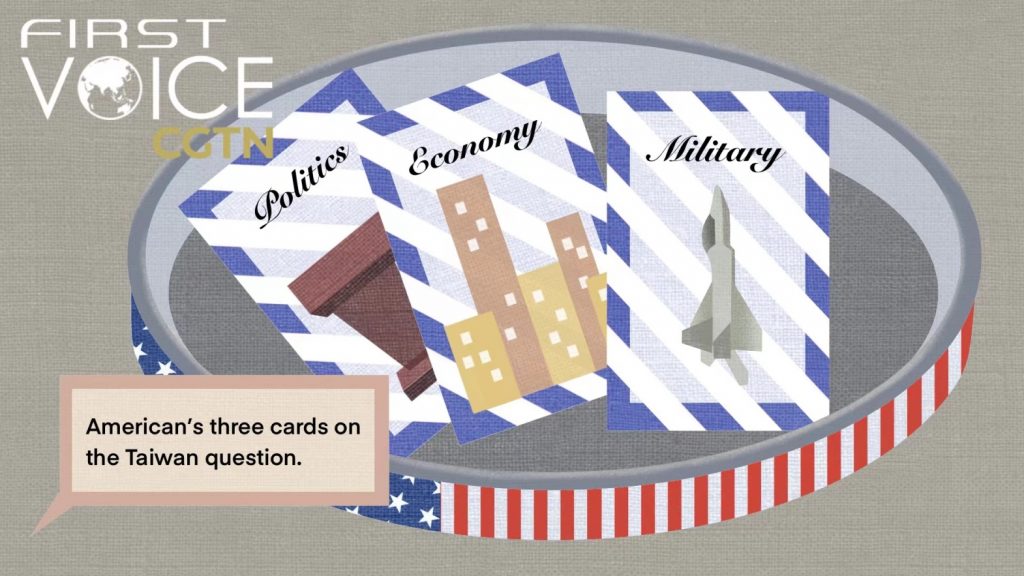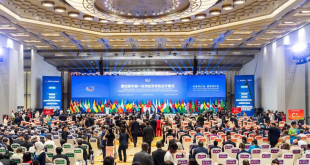Published:August 20,2022

America’s ploy to peel Taiwan off of China. /CGTN
If the Biden administration could use “separation of powers” as the excuse to rid itself of being responsible for U.S. lawmakers’ continued visit to China’s Taiwan region, it can’t get off the hook this time.
On August 17, the Office of the United States Trade Representative, a part of the Executive Office of the President, announced that it has “reached consensus on the negotiating mandate for the U.S.-Taiwan initiative on 21st-Century Trade.” The first round of negotiations are scheduled to take place in early fall. AP describes the move as “a sign of support for the island democracy that China claims as its own territory.”
AP’s description precisely reflects the mentality behind America’s continued provocation and infringement on China’s sovereignty. Despite officially acknowledging the one-China principle, the U.S. politicians have been turning to aggressively pursue what Henry Kissinger warned against as the “Two-China solution.” From the cabinet-level officials’ visits to the island during the Trump administration to the U.S. Speaker of the House Nancy Pelosi’s trip just a couple of weeks ago, the United States has made it abundantly clear that despite paying lip service to the one-China principle, American politicians can freely treat the island as a separate entity from China. Not to mention, there has been more than $20 billion dollars of arms sales since 2016 and the American military is constantly showing their teeth around the island that are intended to scare off any actions by the Chinese mainland.
Political, military, now comes the economic infringement.
The trade negotiation is just the beginning. The United States have been wanting to bring China’s Taiwan region into more international institutions and organizations that China is already in. During the COVID-19 pandemic, American politicians decried that the World Health Organization didn’t accept Taiwan as a member and pushed to have Taiwan included at the World Health Assembly. When Joe Biden launched the Indo-Pacific Economic Framework, it is reported to have excluded Taiwan so that other countries won’t have to worry about offending China. This new trade initiative looks like a suitable first step for the U.S. to settle a “bilateral” trade relationship with the region before finding a way to bring it into a more multilateral framework.
Activists from Pivot to Peace, ANSWER Coalition, CODEPINK, Veterans for Peace and leaders of the Chinese community in San Francisco hold a demonstration in front of U.S. House Speaker Nancy Pelosi’s office at the San Francisco Federal Building on August 1, 2022. /CFP
It’s a cheap ploy and an unwise one. China’s Taiwan region may be a big trade destination for the U.S. with the more than $100 billion trade volume. However, that’s the just a hollowed-out number. CNBC reported that, in 2021, Taiwan region’s data showed that the Chinese mainland and the Hong Kong Special Administrative Region accounted for 42 percent of Taiwan’s “export.” The U.S. only had 15 percent.
A total of $188.91 billion goods from the Taiwan region were sold to Chinese mainland and HKSAR – the amount of goods sold alone is larger than Taiwan region’s trade with the U.S. The Chinese mainland and HKSAR accounted for 22 percent of “imports” for the Taiwan region. The U.S. only had 10 percent.
And if we are talking about big numbers, the China-U.S. trade stands at $755.6 billion in 2021 – a relationship that grew by nearly 30 percent from 2020 despite the trade sanctions, the COVID-19 pandemic and the political conflicts between the two countries.
There is no “two China,” there is only one China. America needs to see clearly that the “one China” is good for the United States itself – especially given the skyrocketing inflation and the energy crisis that it’s facing. U.S.’ systematic push for Taiwan to gain de-facto independence serves neither the U.S., nor the Chinese mainland nor the Taiwan region’s interests.
Kissinger warned that the U.S. should not “by subterfuge or by a gradual process” create a “two-China” solution. As someone who achieved breakthroughs in the China-U.S. relationship under extremely difficult circumstances, his words carry weight. The headline-chasing and attention-grabbing American officials should heed his warnings.
 Africa -China Review Africa -China Cooperation and Transformation
Africa -China Review Africa -China Cooperation and Transformation
